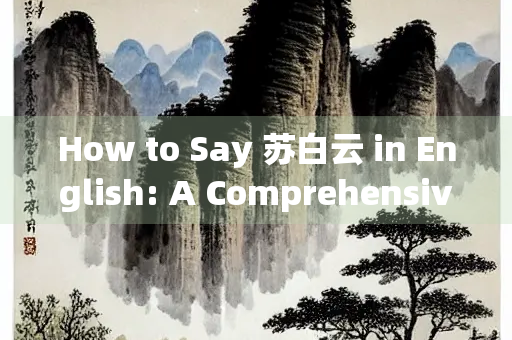Introduction

When it comes to translating Chinese names into English, many people encounter challenges due to differences in pronunciation, cultural context, and naming conventions. One such name is "苏白云" (Sū Báiyún). If you've ever wondered how to properly say or write this name in English, this article will provide a detailed explanation, covering pronunciation, possible translations, and cultural considerations.
Understanding the Name "苏白云"
Before translating, it's essential to break down the name "苏白云" to understand its components:
1、苏 (Sū) – A common Chinese surname, also meaning "revive" or "perilla" (a type of herb).
2、白云 (Báiyún) – A given name meaning "white cloud." It carries a poetic and serene connotation, often symbolizing purity, freedom, and natural beauty.
Thus, "苏白云" can be interpreted as "Su Baiyun," where "Su" is the family name and "Baiyun" is the given name.
How to Translate "苏白云" into English
1. Direct Transliteration: "Su Baiyun"
The most straightforward way to translate "苏白云" into English is throughpinyin, the official romanization system for Mandarin Chinese.
苏 (Sū) → "Su" (Note: The tone mark is often omitted in English contexts.)
白云 (Báiyún) → "Baiyun"
This results in"Su Baiyun", which is widely accepted in academic, professional, and official documents.
Why Use "Su Baiyun"?
- It preserves the original pronunciation.
- It follows standard Chinese-English name conventions (surname first, given name last if following Chinese order, or given name first if adapting to Western order).
- It avoids misinterpretation, as some direct translations (e.g., "White Cloud Su") may sound unnatural in English.
2. Alternative: "Baiyun Su" (Western Name Order)
In Western contexts, names are often written in the orderGiven Name + Surname. Thus, "苏白云" could also be written as:
"Baiyun Su"
This format is common in international settings, such as academic papers, business cards, or social media profiles where Western name order is preferred.
3. Literal Translation: "White Cloud Su" (Less Common)
While not standard for personal names, aword-for-word translation of "白云" would be "white cloud." Thus, one could theoretically write:
"White Cloud Su"
However, this approach israrely used for personal names because:
- It sounds more like a nickname or poetic description rather than a formal name.
- It may cause confusion in official documents where consistency with legal names is required.
Pronunciation Guide for "Su Baiyun"
For English speakers unfamiliar with Mandarin pronunciation, here’s a simple breakdown:
Su → Pronounced like "Sue" (rhymes with "blue").
Baiyun → "Bye" + "Yoon" (similar to "bye" and "lune" in French).
So, "Su Baiyun" sounds like"Sue Bye-yoon."
Cultural Considerations When Translating Chinese Names
When dealing with Chinese names in English, several factors should be considered:
Chinese convention: Surname first (e.g.,Su Baiyun).
Western convention: Given name first (e.g.,Baiyun Su).
The choice depends on context. In formal Chinese settings (e.g., passports, academic papers), "Su Baiyun" is standard. In Western interactions, "Baiyun Su" may be more intuitive.
2. Tone Marks in Pinyin
While pinyin includes tone marks (e.g., Sū Báiyún), they are often omitted in English writing unless for linguistic study.
3. Avoiding Misinterpretation
Some names, when directly translated, may sound odd in English (e.g., "Apple," "Dragon"). Thus, sticking to pinyin ("Su Baiyun") is usually the safest choice.
Examples of Chinese Names in English
To better understand, here are some well-known Chinese names and their English versions:
| Chinese Name | Pinyin (English) | Literal Meaning |
| 马云 | Ma Yun | "Horse Cloud" |
| 李小龙 | Li Xiaolong | "Little Dragon Li" (Bruce Lee) |
| 周杰伦 | Zhou Jielun | Jay Chou (stage name) |
| 范冰冰 | Fan Bingbing | "Ice Ice Fan" |
As seen, most Chinese names are rendered in pinyin rather than literal translations.
When Might "White Cloud Su" Be Acceptable?
While "Su Baiyun" is the standard, there are cases where a translated version might be used:
1、Literary or Artistic Contexts – If "苏白云" is a character in a novel or film, "White Cloud Su" could be a stylistic choice.
2、Nicknames or Informal Use – Friends might playfully use "White Cloud" as a nickname.
3、Brand or Business Names – If "白云" is part of a company name (e.g., a tea brand), a translation might be used for marketing.
However, for official purposes,"Su Baiyun" or "Baiyun Su" remains the correct form.
Conclusion: The Best Way to Say "苏白云" in English
After considering different approaches, the most accurate and widely accepted translation is:
"Su Baiyun" (苏白云)
Formal & Official Use: "Su Baiyun" (surname first, standard in Chinese contexts).
Western Adaptation: "Baiyun Su" (given name first, common in international settings).
Avoid: "White Cloud Su" unless in creative or informal contexts.
By following these guidelines, you ensure clarity and respect for Chinese naming conventions while making the name accessible to English speakers.
Final Thoughts
Translating names between languages requires balancing accuracy, cultural sensitivity, and practicality. "苏白云" is best rendered as"Su Baiyun" in English, preserving its original sound and meaning. Whether used in official documents, social introductions, or creative works, this translation maintains authenticity while ensuring cross-cultural understanding.
Would you like further clarification on any aspect of Chinese name translations? Feel free to ask!
本文地址: https://www.shuiwy.com/a/100524.html
文章来源:im
版权声明:除非特别标注,否则均为本站原创文章,转载时请以链接形式注明文章出处。
2026-02-07im
2026-02-07im
2026-02-07im
2026-02-07im
2026-02-07im
2026-02-07im
2026-02-07im
2026-02-07im
2026-02-07im
2026-02-07im
2024-03-03im
2024-01-24im
2023-05-29im
2023-06-04im
2023-06-16im
2023-10-07im
2023-06-20im
2023-10-07im
2023-06-19im
2023-06-14im
扫码二维码
获取最新动态
